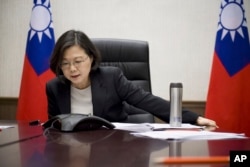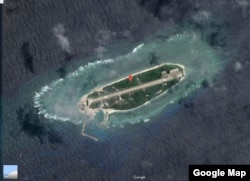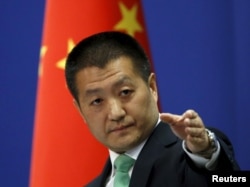Many in China initially welcomed the election of Donald Trump as the next president of the United States, viewing it as a win for Beijing and believing that as a businessman his approach would be more straightforward than that of his contender.
But a phone call and a few Tweets later, that view is starting to change quickly as many here are realizing his presidency may not be as predictable as many had originally hoped. And talk about the possible diplomatic and economic blowback from Beijing is growing.
Call me
On Friday, President-elect Trump broke with decades of diplomatic tip-toeing and spoke directly with Taiwan’s President Tsai Ing-wen on the phone. The call shocked Beijing not only because with it Trump became the first president-elect to make such a call, but also because in his Tweet, Trump referred to her by her official title: President Tsai.
The United States switched diplomatic ties to Beijing in 1979 and China claims the democratically-ruled island as part of its own territory. Under agreements made as part of that shift in diplomatic recognition, Washington agreed to cut political ties with Taiwan.
In Washington, White House spokesman Josh Earnest said Monday U.S. officials are in touch with Beijing to reiterate the "One China" policy after Trump's recent phone call.
WATCH: Earnest on Trump's contact with Taiwan
Just as Beijing was recovering from that last Friday's assault on its diplomatic senses, Trump released two more Tweets early Monday, Beijing time.
“Did China ask us if it was OK to devalue their currency (making it hard for our companies to compete), heavily tax our products going into..” he said in one Tweet and continued in another… “their country (the U.S. doesn’t tax them) or to build a massive military complex in the middle of the South China Sea? I don’t think so!”
Back to reality
Wang Dong, a political science professor at Peking University said that Trump’s Tweets appear to be mere “bluffing” and in line with his stated ability of being a good negotiator. But, he adds, it is also clear he is surrounding himself with individuals in the Republican Party who have hawkish views toward China.
“And I think that gives us reason to be worried about U.S.-China relations going forward,” Wang said. “There has been too much wishful thinking and overly optimistic expectations about Donald Trump in China and I think now, people have to come back to reality.”
Stern representations
So far, Beijing has kept criticism of Trump to a minimum and China’s response to the call has been less harsh than many had predicted. China’s Foreign Minister has called the phone conversation nothing more than a “petty trick” by Taiwan. It has also issued “stern representations” to “relevant parties” in the United States and the U.S. embassy in Beijing.
At a regular briefing Monday, the first since the phone call, Foreign Ministry spokesman Lu Kang did not make any additional statements about the incident nor did he comment directly on Trump’s recent Tweets – including his first about the touchy South China Sea issue.
Lu said the Trump transition team was clear about China’s position regarding the phone call with Taiwan President Tsai Ing-wen, and said Beijing has been in touch with the president-elect’s team. Lu did not state explicitly whether a call had been made to the team after the Trump and Tsai spoke, but stressed the importance
Although he did not comment on Trump’s criticisms of China’s economic and military policies, he talked about the benefits of the U.S.-China relationship and Taiwan from Beijing’s perspective, calling it the “most important” and “most sensitive” issue.
The proper handling of the Taiwan issue, he said, “is an important political pre-condition that has helped ensure the continual and healthy development of U.S.-China relations and allows the continued development of mutually beneficial relations.”
Trump contingencies
Communist-backed state media have been more blunt and direct in their criticisms of Trump, arguing that his decision to speak with Tsai was a sign of his “inexperience” and lack of understanding of the sensitive nature of China’s views regarding Taiwan.
The nationalistic Global Times urged the government to do more, but to keep the focus on Tsai and her new government for now.
China “can let Taiwan lose one or two diplomatic allies as a punishment as well as a warning.” It also argued that Beijing could strengthen its military deployments in case Taiwan makes any moves toward independence.
At the same time, though, the newspaper argued that China needs to be tactful and skillful in dealing with Trump, adding that it “should understand that Trump has two faces.”
“On the one hand he is bluffing and unpredictable, and on the other, he has no plan to overturn international relationships, and will focus on U.S. internal affairs to “make America great again,” it argued.
Assumptions aside, no one knows for sure how Trump’s approach will be different and what he may eventually do when in office. And because of that, China needs to prepare policies regarding the currency and even the South China Sea, said Peking University’s Wang Dong.
“China would be well advised to make preparations for contingencies,” Wang said.










